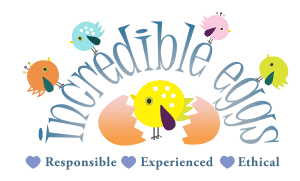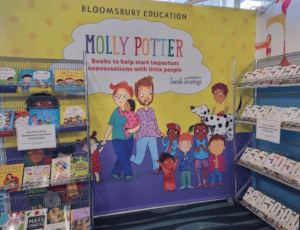
Incredible Eggs is deeply passionate about education, particularly when it comes to the importance of understanding and appreciating the natural world. With a focus on providing hands-on, interactive experiences for young people, we believe that education is not just about learning facts and figures, but about fostering a sense of wonder and curiosity about the world around us. By encouraging children to engage with nature, we hope to inspire the next generation of biologists, scientists, veterinarians, conservationists – and who knows – perhaps even midwives!
That’s why we chose Molly Potter, an accomplished ex-teacher, author and trainer to contribute to our educational materials.
Molly is the author of numerous best-selling books on emotional intelligence and education; her books have been translated into multiple languages and are used by educators, parents, and children all over the world. In addition to her success as an author, Molly is also a sought-after speaker and trainer, with a wealth of experience in delivering engaging and informative talks and workshops on a variety of topics related to emotional intelligence and wellbeing. She works directly with many schools and nurseries across the UK, as well as with private companies. Her bespoke contributions to our hatching kit experience have helped to make our educational resources truly exceptional.
We want to share some of Molly’s knowledge and insights and hope that this interview provides a valuable perspective on some topics related to emotional intelligence, teaching, and learning.
All images contained in this blog are shared with Molly’s kind permission. We hope you enjoy!
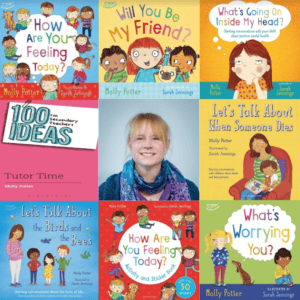
Q – Can you explain to us what emotional intelligence is?
A – My answer to this question can last hours so best not to ask me if you can’t get away! But, in a nutshell, it’s the ability to manage emotions resourcefully rather than letting them control and dominate your thoughts and behaviour.
A slightly more detailed answer would be……. Quite often when we are experiencing a strong emotion, we only really acknowledge what we do and any physical reactions. But with emotional intelligence (EQ) we don’t just react, we look at the ‘back story’ of an emotion: what triggered it, it’s associated thoughts and whether they are helpful, the messages an emotion might be delivering, and once that’s considered, we work out what the best course of action is, even if sometimes that means doing nothing and ‘letting it go’.
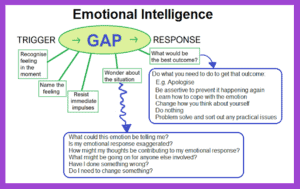
Q – What are some of the issues you have noticed in children who do not develop adequately in this area?
A – I think most of us have room for improvement when it comes to emotional intelligence! I worked for ten years in a Pupil Referral Unit where children struggled to regulate their emotions and therefore, behaviour. Poor emotional intelligence can lead to impulsive and destructive behaviours (including self-destructive behaviours) that usually make any situation worse. It can also mean that negative and uncomfortable emotions can affect how we think in a way that can overwhelm us and contribute to us making poor choices.
Poor EQ means we repeat the same responses again and again to similar situations without being aware of our repetition. For example, if we felt someone was mocking us, we might insult the person who laughed and storm off because that was a defensive coping strategy we used as a young child. Unless we unpick and re-frame situations that trigger strong emotional reactions, we are destined to continue to react in the same unhelpful way again and again. Inflexible, automatic and unhelpful reactions rarely bring about beneficial change in ourselves or others.
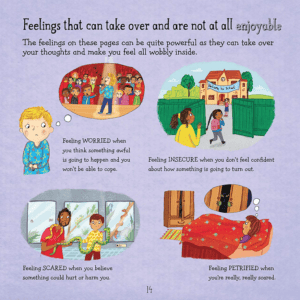
Q – How can emotional literacy skills help children in their day-to-day lives, both in and out of the classroom?
A – There has been much research on EQ and it’s claimed emotional intelligence impacts beneficially on mental health, resilience, motivation, self-awareness and relationship skills. It’s easy for me to see why this is so. EQ definitely makes life easier and more fulfilling. My own journey with EQ is testament to this. Good EQ means we are curious about why an emotion has arrived, we can ‘listen’ to any message an emotion might be giving us and then consciously decide what we want or need to do based on all we have considered. For example, if someone’s actions resulted in our anger, with poor EQ we might respond with aggression. With excellent EQ however, our curiosity would mean we notice our emotional reaction as it arose, we consider what the trigger was, we question whether our reaction was down to any particular sensitivities or inaccurate self-beliefs, we consider what might be going on for the other person, we accept everyone (including ourselves) makes mistakes, we consider whether anything needs sorting and decide whether we needed to ‘let go’ of the incident or assertively challenge what caused the situation. That’s the aim anyway!
Emotional intelligence is clearly beneficial in the classroom too. Each time we ask pupils to learn, we are asking them to take the emotional risks associated with failing. To embark on learning with gusto, we need to be able to manage the anticipation of possibly messing up and the necessary bounce-back required when we do! That takes EQ. The classroom can be a hotbed of emotions – both positive and negative – and yet this is often underacknowledged.
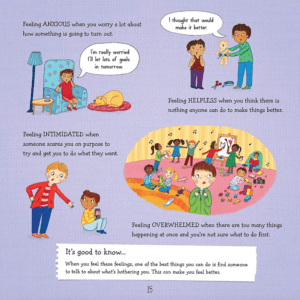
Q – How do you think our hatching kits could be used to explore emotional intelligence?
The experience of receiving a hatching kit, waiting for the eggs to hatch, seeing the eggs hatch and then caring for the chicks or ducklings take children on a wonderful journey. Like many things in life, this journey will trigger different emotions. I would encourage children to think about how they felt at each stage and I might use the diagram below to help with this. It will certainly increase their emotional vocabulary and increase their focus on what they feel and why.
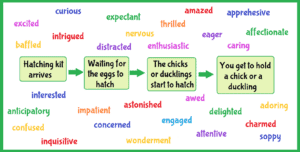
Q – You have written a wide range of publications, spoken at numerous events and worked directly with many educational establishments. What have been some of your favourite experiences or accomplishments in these areas?
A – Ooo there are so many! One of the most exciting opportunities was delivering training in schools in India. Aside from the fact I love travelling, it was great to see how my training was received in a different culture. I have enjoyed delivering (several) assemblies about emotions to Key Stage 1 pupils. KS1 children always entertain me more than I entertain them!
I also really enjoy working with parents and carers. In delivering EQ sessions I often end up helping parents consider their own EQ alongside giving them tools for helping their children develop it. This always feels really meaningful. Delivering Relationships and Sex Education (RSE) at a festival was also certainly novel!
And I love writing books of course! I still have a soft-spot for the first books I got published: Outside the Box, as they include creative thinking activities I used as a teacher many years ago. But more currently, I really, really enjoy taking a concept – like mental health – and distilling it into a book that children can consume.
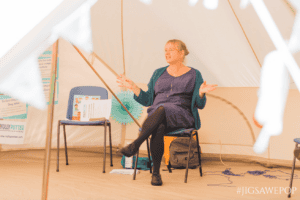
Q – What advice would you give to educators who are looking to make a positive impact in the field of emotional literacy?
A – If you haven’t already, put emotions on the agenda! Our world tends to see emotions as totally irrational and inconvenient. Often emotions get ignored and suppressed and yet they are a huge part of being human. They can sometimes ‘consume’ us and affect all we do if we haven’t learnt to manage them well. It’s hard to learn to manage them well if they are rarely being acknowledged.
In practical terms this means helping children to:
- Recognise the physical symptoms of different emotions as some children struggle with this. Paying attention to symptoms also helps children to focus inwardly when in the grip of a strong emotion, rather than reacting outwardly.
- Name emotions so that awareness of feelings and emotion vocabulary increases
- ‘Check– in’ on feelings to become better at acknowledging emotions in the moment
- Validate all emotions even if they seem like an over-reaction to you. Emotions are very real for the person experiencing them and to have our emotions dismissed can shame us or make us feel rejected.
- Consider different triggers of different emotions so the links between emotions and their triggers can be made
- Look at the effect emotions have on thinking
- Consider what emotions might be telling us and whether it is useful or not
- Find coping strategies for uncomfortable emotions
- Learn to expect and endure uncomfortable emotion as a normal part of life
- Understand that emotions can make us behave impulsively and that it’s better to pause and make careful decisions rather than acting in the heat of the moment.
As an educator, it’s also important to model emotional intelligence. The best way to do this is to regularly model ‘I statements’ e.g. ‘I feel flustered when I lose my diary.’ A training session I have delivered a few times is, ‘Teaching Emotional Intelligence through activities, drama and games.’ This gives teachers some fun tools for covering an ‘EQ curriculum’.
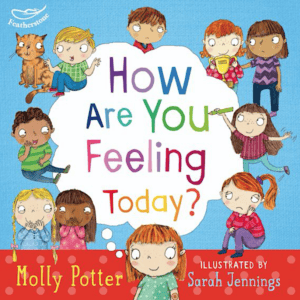
Q – We know you write regular blogs and offer free resources in addition to the various services you offer directly to schools and nurseries. Can you provide links to where educators can access information about these?
A – For my blog, information about training and much more, visit my website
Get more regular updates form my Facebook page
My not-overly-active Twitter account
A few videos relating to EQ can be found on my YouTube channel
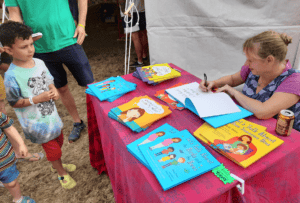
Q – Can you provide any links to where educators can find out more about your books?
A – My books an be found on the Bloomsbury website and Amazon
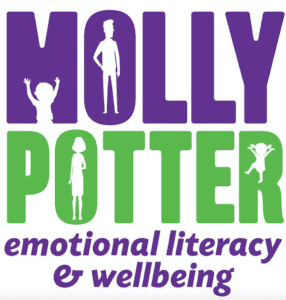
To all educators out there, we would like to send a message of appreciation and admiration for the incredible work you do every day. We know that yours is not an easy job, and that you are constantly seeking out new and innovative ways to engage your students and promote their learning. We highly recommend Molly Potter to those looking to improve their practices and particularly when developing emotional literacy in their students, either via her numerous books or as a speaker/trainer. We’d also like to thank Molly for taking the time to answer our questions.
Please follow the links below to find out more about the bespoke educational resources Molly has created exclusively for Incredible Eggs and which are included in the hatching kit price.
‘Respecting Living Things’ – suitable for Key Stage 1 and 2
Science-based resources – suitable for EYFS, Key Stage 1 and 2
